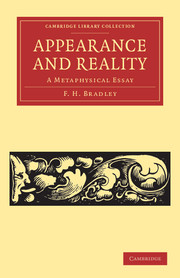
-
Select format
-
- Publisher:
- Cambridge University Press
- Publication date:
- November 2012
- December 2011
- ISBN:
- 9781139136501
- 9781108040242
- Dimensions:
- Weight & Pages:
- Dimensions:
- (216 x 140 mm)
- Weight & Pages:
- 0.73kg, 584 Pages
You may already have access via personal or institutional login
Book description
F. H. Bradley (1846–1924) was the foremost philosopher of the British Idealist school, which came to prominence in the second half of the nineteenth century. Bradley, who was a life fellow of Merton College, Oxford, was influenced by Hegel, and also reacted against utilitarianism. He was recognised during his lifetime as one of the greatest intellectuals of his generation and was the first philosopher to receive the Order of Merit, in 1924. His work is considered to have been important to the formation of analytic philosophy. In metaphysics, he rejected pluralism and realism, and believed that English philosophy needed to deal systematically with first principles. This work, first published in 1893, is divided into two parts: 'Appearance' deals with exposing the contradictions that Bradley believed are hidden in our everyday conceptions of the world; and in 'Reality', he builds his positive account of reality and considers possible objections to it.
Contents
Metrics
Full text views
Full text views help Loading metrics...
Loading metrics...
* Views captured on Cambridge Core between #date#. This data will be updated every 24 hours.
Usage data cannot currently be displayed.
Accessibility standard: Unknown
Why this information is here
This section outlines the accessibility features of this content - including support for screen readers, full keyboard navigation and high-contrast display options. This may not be relevant for you.
Accessibility Information
Accessibility compliance for the PDF of this book is currently unknown and may be updated in the future.


